Episode 465: High desert flower farming in Arizona with Aishah Lurry of Patagonia Flower Farm
August 5th, 2020
Podcast: Play in new window | Download
Subscribe: Apple Podcasts | Podcast Index | RSS | More
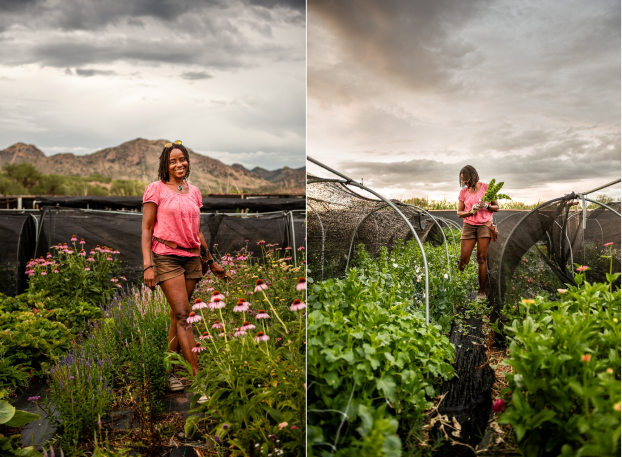
Way back in February B.C. — and by that I mean February, Before COVID — a Phoenix Home & Garden Magazine editor named Carly Scholl reached out to request an interview. She sent an email and wrote: I’m working on a story for our upcoming April issue about local flower farms, and my research consequently led me to you and your “slow flowers” movement. Your information and research has certainly informed my article so far, but I would love to do a short interview with you about this slow flowers concept to further educate our readers.

Carly and I had a wonderful conversation — her interest in locally-grown flowers was so encouraging! And in April, she published a four page feature about three fabulous flower farmers in Arizona, including today’s guest, Aishah Lurry of Patagonia Flower Farm. It’s a great article titled “How the Slow Flowers Movement is Making Arizona Bloom,” with the subhead: “Three local flower farms are cultivating communities around eco-conscious blossoms.”
You’ll be inspired by its focus on the importance of local and sustainable flowers and by the stories of all three farmers profiled, including Anne Jensen of Anne E’s Garden Fresh in Phoenix, also a Slow Flowers member, and Shanti Rade of Whipstone Farm in Paulden, a past guest of this podcast.
Read the full article here: “How the Slow Flowers Movement is Making Arizona Bloom”
Read the companion piece: “A Q&A With Debra Prinzing”
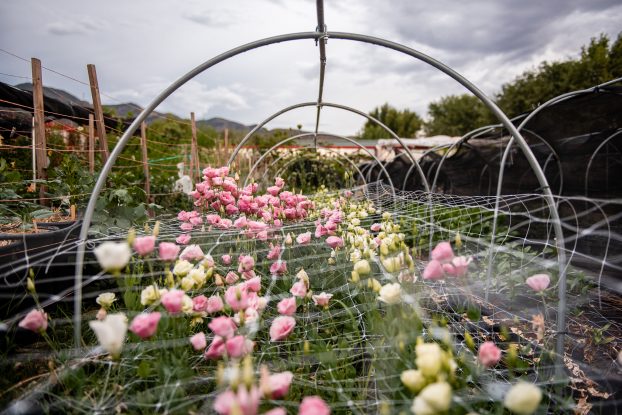
The article did another important thing as it revealed the state’s geographic diversity when it comes to growing flowers. As Aishah and I discuss, Arizona’s flower farmers have much in common, but the state’s growing zones vary widely. Patagonia is located in USDA Zone 8a with average minimum temperatures of 10 to 15 degree; you’ll hear Aishah discuss what this means for her long growing season, despite low precipitation and high daytime temperatures during some times of the year.
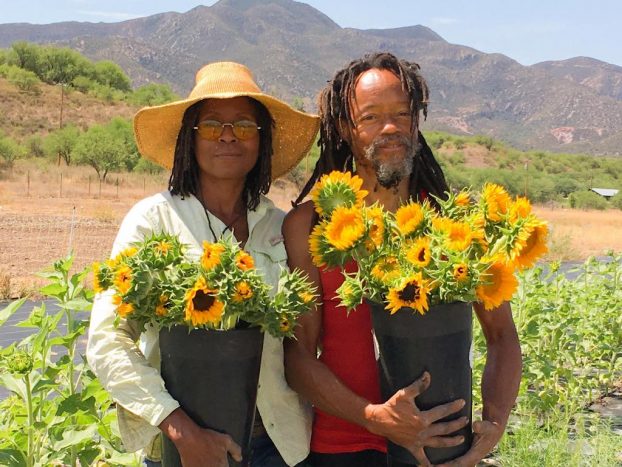
Here’s a bit more about Aishah, adapted from the Patagonia Flower Farm web site:
Aishah says flowers are one of the greatest passions in her life. After years of feeling frustrated about having to drive miles out of town for overpriced bouquets filled with imported flowers that died quickly, she decided to start her own micro-farm, Patagonia Flower Farm in 2017. Now her neighbors enjoy the beauty of fresh flowers that last days while keeping their carbon footprint small.
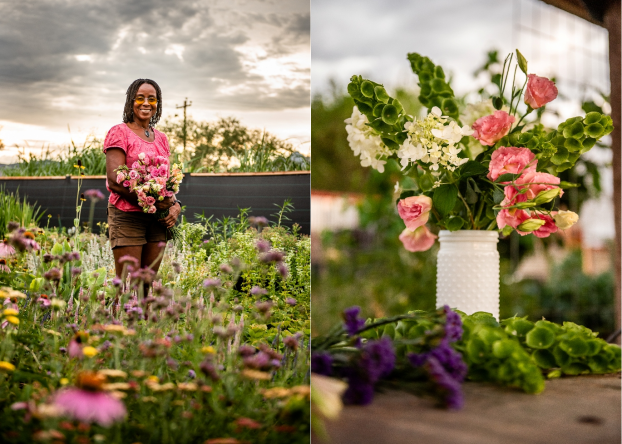
Gardening has been a personal joy of Aishah’s for more than 20 years. She has taught several classes about sprouts, micro-greens, and propagation and today serves with Borderlands Restoration Network to further its native species and public education programs.
Aishah shares her horticultural knowledge and gardening expertise to help customers enjoy the natural beauty and elegance that fresh, local flowers offer. She considers her flowers a local, affordable, and well-deserved luxury. Each flower in Aishah’s hand-picked bouquets are lovingly grown to ensure health, vibrancy, and longevity of the ingredients. Patagonia Flower Farm ‘s organic and sustainable practices keep the Earth and bees happy and healthy.
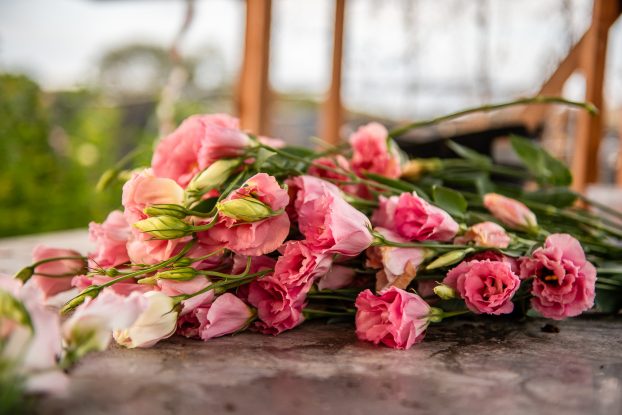
Find and follow Patagonia Flower Farm at these social places:
Patagonia Flower Farm on Facebook
Patatonia Flower Farm on Instagram
More about Aishah’s Hydroponic Tulip Production
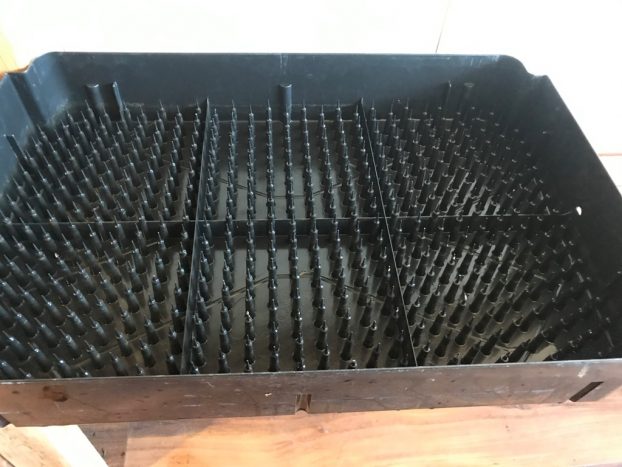
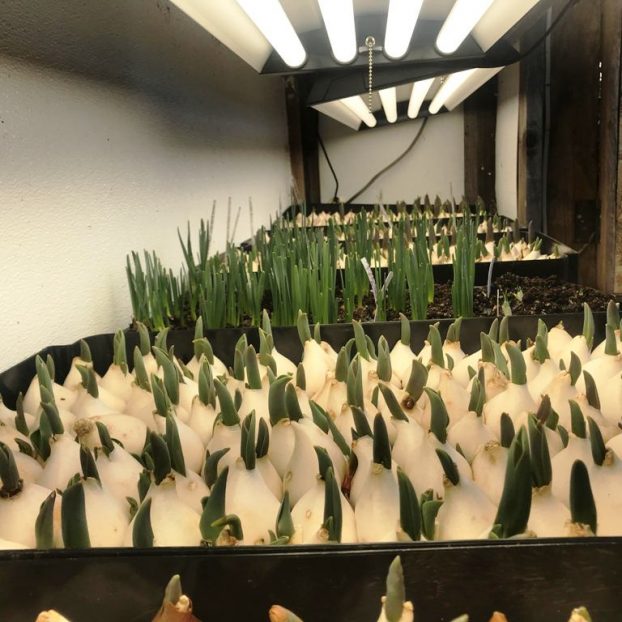
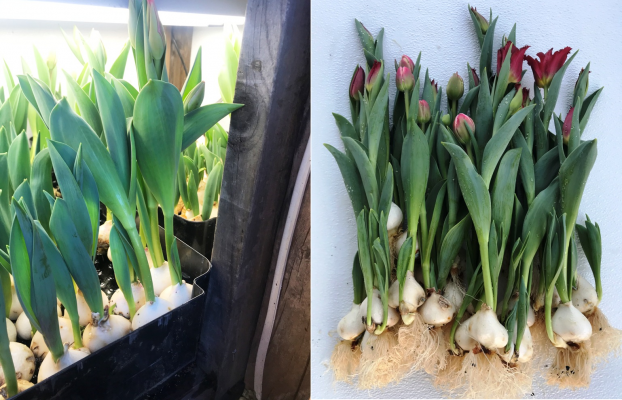
Aishah sources the bulb trays from Leo Burbee Bulb Co. in Ohio
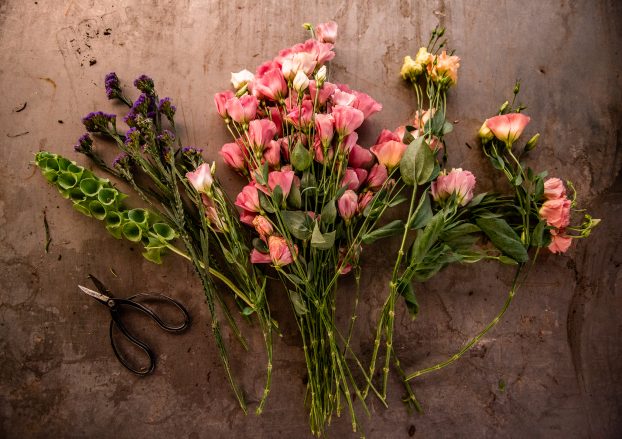
Thanks so much for joining my conversation with Aishah Lurry. I’m encouraged by her focus on community and collaboration — a model we’ve seen happen with success across the Slow Flowers Movement — and definitely among the new Arizona Cut Flower Growers group. Watch for details about the future of this collective. And if you’re in the Tucson area, reach out to Aishah to join her CSA customer list. This was a great episode and I learned so much about the personal drive to grow flowers in challenging conditions. Best of luck with those dahlias, Aishah!

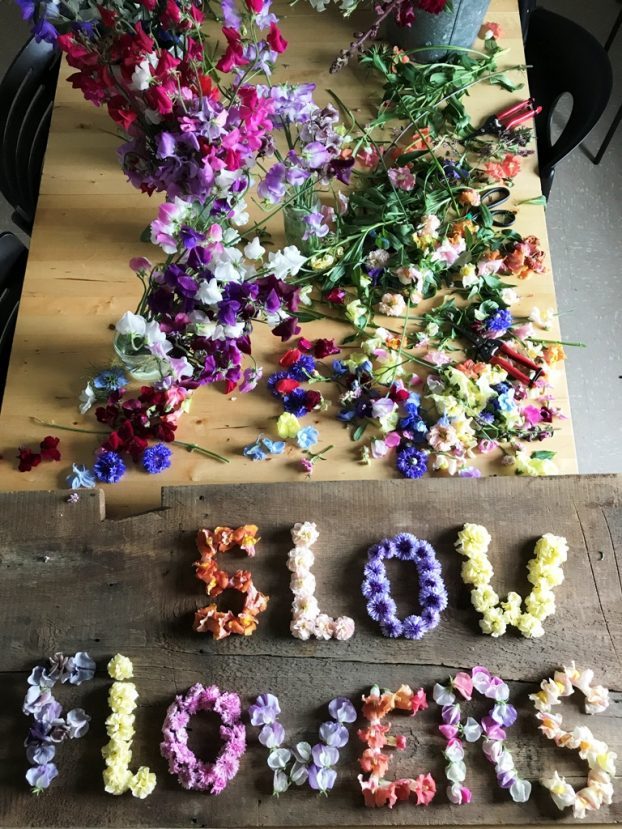
Now, more than ever, your Slow Flowers Membership gives you an important story to share with your community and your customers. Our monthly Slow Flowers Meet-Ups continue Friday, August 14th (9 am PT/Noon ET) and you’re invited to join us – virtually – via Zoom.
The COVID-19 pandemic drove us to begin this ritual in late March, and I’ve heard from so many of you who have valued the opportunity to connect with kindred spirits across the continent. After hosting weekly Meet-Ups for about 10 weeks, we shifted to monthly sessions to accommodate the increasingly busier and complicated schedules of our members. Since June, we’ve met on the second Friday morning of each month.
If you missed last month’s Meet-Up, you can find video from our July 10th Slow Flowers Member Virtual Meet-Up with featured guests wedding designer and stylist Joy Proctor, founder and creative director of Joy Proctor Design and Slow Flowers members and wedding and event designers Adam Rico and Alicia Rico of Dallas-based Bows and Arrows Flowers. Learn about the first @saytheirnamesmemorial in Portland, Oregon, installed on Juneteenth (June 19th) by Joy Proctor and a group of friends, artists, designers and craftspeople, and created in several other cities including Dallas and Atlanta by Bows and Arrows Flowers.
Join us on Friday, August 14th
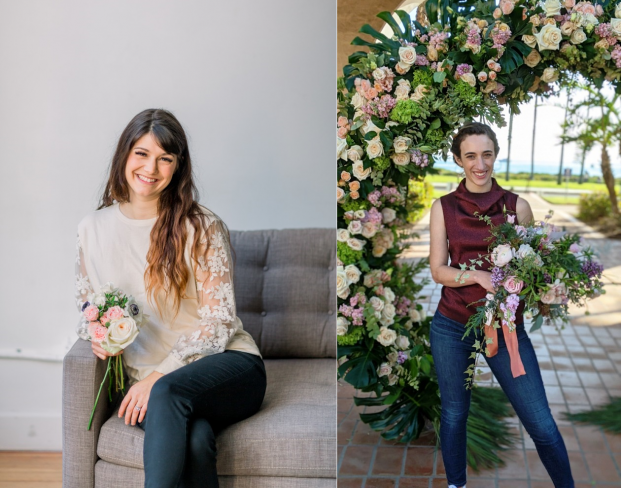
This month’s guests include Gina Thresher of From the Ground Up Floral and Tonneli Gruetter of Salty Acres Farm — they’re among the instructors in a new virtual floral conference taking place in late August called Fleurvana. You’ll hear more from Gina and Tonneli and learn how you can grab a free registration for the three-day conference — I’ll be speaking there too. You can join us at this link. See you next Friday!
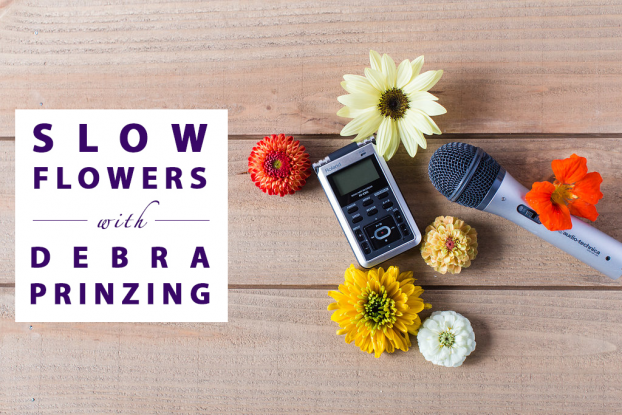
The Slow Flowers Podcast has been downloaded more than 630,000 times by listeners like you. Thank you for listening, commenting and sharing – it means so much.
As our movement gains more supporters and more passionate participants who believe in the importance of the American cut flower industry, the momentum is contagious. I know you feel it, too. I value your support and invite you to show your thanks and with a donation to support my ongoing advocacy, education and outreach activities. You can find the donate button in the column to the right.
Thank you to our Sponsors
This podcast is brought to you by Slowflowers.com, the free, nationwide online directory to florists, shops, and studios who design with American-grown flowers and to the farms that grow those blooms. It’s the conscious choice for buying and sending flowers.
Florists’ Review magazine. I’m delighted to serve as Contributing Editor for Slow Flowers Journal, found in the pages of Florists’ Review. Read our stories at slowflowersjournal.com.
Mayesh Wholesale Florist. Family-owned since 1978, Mayesh is the premier wedding and event supplier in the U.S. and we’re thrilled to partner with Mayesh to promote local and domestic flowers, which they source from farms large and small around the U.S. Learn more at mayesh.com.
Johnny’s Selected Seeds, an employee-owned company that provides our industry the best flower, herb and vegetable seeds — supplied to farms large and small and even backyard cutting gardens like mine. Find the full catalog of flower seeds and bulbs at johnnysseeds.com.
The Gardener’s Workshop, which offers a full curriculum of online education for flower farmers and farmer-florists. Online education is more important this year than ever, and you’ll want to check out the course offerings at thegardenersworkshop.com.
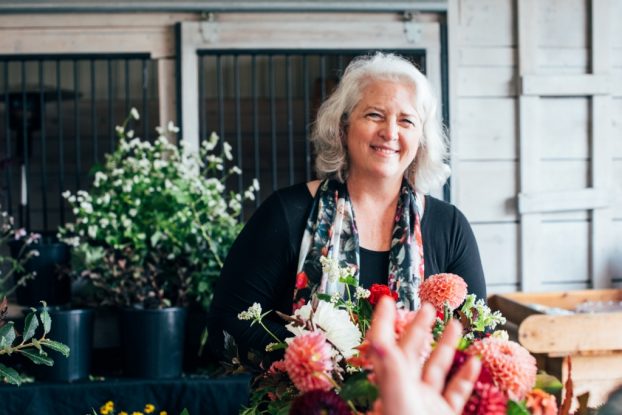
I’m Debra Prinzing, host and producer of the Slow Flowers Podcast. Next week, you’re invited to join me in putting more American grown flowers on the table, one vase at a time. And If you like what you hear, please consider logging onto iTunes and posting a listener review.
The content and opinions expressed here are either mine alone or those of my guests alone, independent of any podcast sponsor or other person, company or organization.
The Slow Flowers Podcast is engineered and edited by Andrew Brenlan. Learn more about his work at soundbodymovement.com.
Music Credits:
Heartland Flyer; Turning on the Lights; Gaena
by Blue Dot Sessions
http://www.sessions.blue
Lovely by Tryad
http://tryad.bandcamp.com/album/instrumentals
http://creativecommons.org/licenses/by-sa/3.0/
In The Field
audionautix.com








